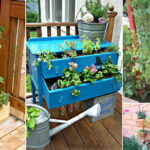Gardening is not merely a pastime; it is a multifaceted hobby that yields a plethora of rewards for the individual engaged in it. The deliberate act of nurturing plants cultivates not just botanical growth but also personal development, environmental stewardship, and community connection. The multifarious benefits extended by gardening have garnered attention for their potential to enrich the mind, body, and spirit. Thus, embarking on this verdant journey proves to be an enriching pursuit worthy of exploration.
In examining the manifold merits of gardening, one must consider both the psychological and physical advantages that arise from this intricate relationship with nature. The inherent connection to the earth has been shown to foster a holistic sense of well-being, inciting individuals to reflect upon their existence in their immediate surroundings.
To elucidate the profound benefits of gardening, it is prudent to categorize them into three main areas: mental health advantages, physical health enhancements, and social enrichment.
Mental Health Advantages
Engagement in gardening serves as an antidote to the encroaching malaise of modern life, where stress and anxiety are commonplace. The cathartic nature of tilling the soil and planting seeds provides a reprieve from the frenetic pace of everyday existence. Multiple studies have established a correlation between interaction with the natural world and improved mental health outcomes. As individuals immerse themselves in the tranquility of their gardens, they experience reductions in levels of anxiety and depression (Kaplan, 1995).
A pivotal aspect of gardening lies in its ability to foster mindfulness. The act of nurturing plants necessitates a focused awareness of the present moment, diverting attention from intrusive thoughts and stressors. Engaging in these activities compels gardeners to cultivate an appreciation for the minutiae of life—a blossoming flower, the texture of soil, or the sound of rustling leaves—enhancing overall emotional resilience.
Moreover, the rewards of gardening extend into the realm of personal achievement. Watching a seed evolve into a flourishing plant imbues individuals with a sense of accomplishment and satisfaction. This sense of agency is vital in establishing self-esteem and combating feelings of helplessness, reinforcing the notion that individuals possess the ability to create and nurture rather than simply exist.
Physical Health Enhancements
Gardening also promotes physical wellness through a variety of mechanisms. Engaging in gardening tasks demands a range of physical activities, from digging and planting to weeding and watering, all of which contribute to improved fitness levels. Research indicates that gardening can serve as a form of moderate exercise, with individuals expending energy equivalent to that burned during activities such as walking or cycling (Wells & Lekies, 2006). The continuous engagement in these activities encourages cardiovascular health, muscle strength, and joint flexibility.
Additionally, gardening offers an opportunity for individuals to foster healthy eating habits. By cultivating fruits, vegetables, and herbs, gardeners are more inclined to incorporate these nutritious offerings into their diets. Consumption of homegrown produce not only enhances dietary diversity but also increases awareness of food sources, ultimately leading to healthier lifestyle choices.
Furthermore, ample research illustrates that engaging with soil and plants can boost the immune system. Exposure to certain beneficial microbes found in soil, such as Mycobacterium vaccae, has been demonstrated to enhance immune function and likely contributes to improved mood regulation (Lowry et al., 2016). This connection between soil and health elucidates an intricate web of interdependence between human beings and the biosphere.
Social Enrichment
While gardening is often perceived as a solitary endeavor, it can also serve as a social catalyst, nurturing relationships and communal bonds. Community gardens, in particular, exemplify this phenomenon, offering a shared space for individuals to cultivate not only plants but also connections with their neighbors. These gardens function as collective endeavors, promoting inclusivity and cooperation among participants from diverse backgrounds.
Participating in community gardening initiatives has been associated with enhanced social cohesion and a heightened sense of belonging among individuals. These shared experiences evoke feelings of camaraderie and companionship, fostering networks of support that extend beyond the garden gates. Such environments provide opportunities for the exchange of knowledge, skills, and cultural practices, reinforcing the community fabric.
Moreover, gardens act as platforms for educational initiatives, particularly for younger generations. By engaging children in gardening, adults can instill values of responsibility, patience, and sustainability. The process of tending to plants imbues children with an understanding of where food originates and the importance of environmental stewardship. Such lessons resonate deeply, shaping the behavioral patterns and values of future generations regarding sustainability and community gardening.
Integrating Gardening into Daily Life
For those considering gardening as a hobby, starting small can be the key to success. Whether it’s cultivating herbs on a windowsill, tending to a small backyard plot, or participating in a community garden, individuals can tailor their gardening experiences to their available space and resources. The beauty of gardening lies in its adaptability; anyone can find a way to engage with nature, regardless of their circumstances.
To begin this journey, one might explore resources available through local gardening clubs or online forums. Engaging with seasoned gardeners can provide invaluable insights into best practices, plant selections, and sustainable gardening techniques. These connections often become enriching friendships, further embedding individuals within their communities.
The transformative power of gardening extends far beyond mere aesthetics; it invites holistic development and growth, fostering a deeper connection to oneself, to the community, and to the natural world. Whether one seeks to cultivate mental fortitude, enhance physical well-being, or forge social connections, gardening offers an array of benefits that warrant consideration.
In conclusion, venturing into the realm of gardening is an investment in a fulfilling lifestyle change. As individuals engage with plants, they cultivate not only greenery in their backyards but also personal growth and well-being. The benefits of gardening as a hobby are irrefutably manifold and stand as a testament to the intricate relationships shared between humanity, health, and the planet.









Leave a Comment